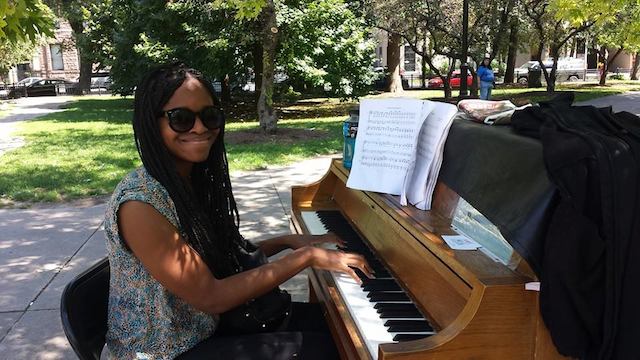Play The Piano In 7 Of Chicago's Public Parks This Summer
By Mae Rice in News on Jun 29, 2016 5:33PM
If you go to Garfield Park Conservatory to, say, see if you can smell any dregs of corpse flower stench, you might stumble on a piano. East Garfield Park conservatory is one of seven parks with a public-access piano in it through Aug. 1.
Open to all and entirely outdoors, these pianos are on the scene as part of the
Pianos in the Parks program, a collaboration between Make Music Chicago, Keys 4/4 Kids, and the Chicago Parks District. Now in its second year, the goal of the program is to "promote music-making," Carlo Diaz, a production coordinator at Rush Hour Concerts, told Chicagoist. Rush Hour is the production company behind Make Music Chicago, and Diaz is involved in the piano program.
"We just want to give people access to musical instruments," Diaz elaborated. "So we just put [a piano] in the park and make it available for anyone to play."
In their previous lives, the pianos were either unwanted or used, then refurbished and donated by Keys 4/4 Kids. Now, As DNAinfo noted earlier today, they reside in the following parks:
East Side's Calumet Park: 9801 S. Avenue G
East Garfield Park's Garfield Park Conservatory: 300 N. Central Park Ave.
Englewood's Hamilton Park: 513 W. 72nd St.
West Rogers Park's Indian Boundary Park: 2500 W. Lunt Ave.
Rogers Park's Loyola Park: 1230 W. Greenleaf Ave.
Logan Square's Mozart Park: 2036 N. Avers Ave.
Near North Side's Washington Square Park: 901 N. Clark St.
The pianos have been open since June 21, when Make Music Chicago held its annual music festival, consisting of hundreds of free performances across Chicago from pros and dabblers alike. As part of the festival, which Diaz said has been running since 2011, Make Music Chicago hosted a show at each of the seven pianos.
Make Music Chicago keeps the pianos in tune, and asks musicians to cover the pianos with provided tarps when they're not playing, to protect the instruments from the weather. In some parks, pianos are locked under these tarps overnight; "we have had some people come and vandalize them before," Diaz said.
Pianos should be accessible during park hours, though. If you're having trouble finding one in a park, Diaz said you can always ask directions at the park's fieldhouse.
